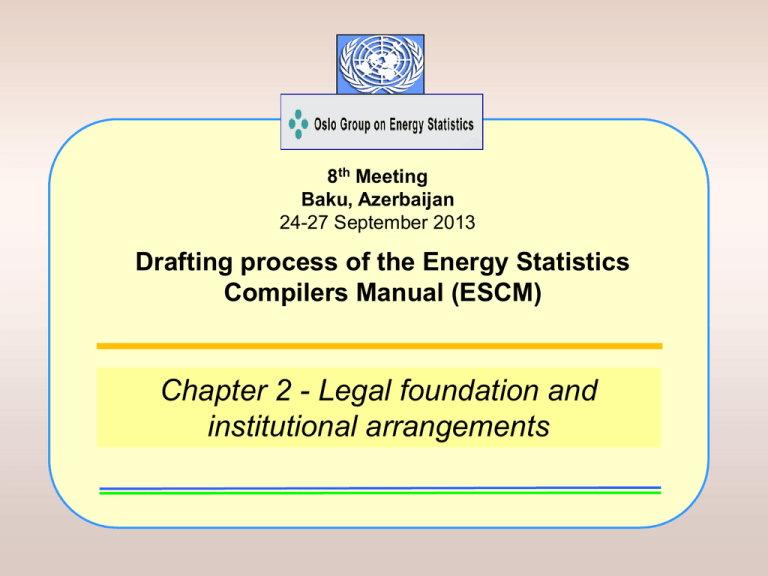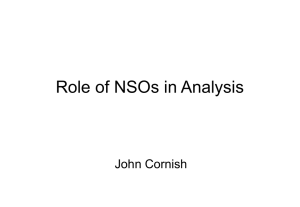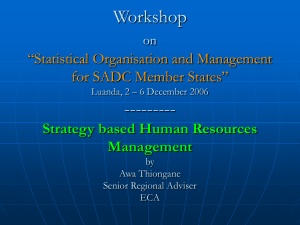Chapter 2 - Oslo Group
advertisement

8th Meeting Baku, Azerbaijan 24-27 September 2013 Drafting process of the Energy Statistics Compilers Manual (ESCM) Chapter 2 - Legal foundation and institutional arrangements contents 1. Context and Purpose of the Chapter 2. Legal framework 3. Institutional arrangements 4. Conclusions I. Context and Purpose of the Chapter Context Two crucial roles of energy statistics for measuring and assessing the development of countries are: 1. Have data and indicators for designing, implementing and monitoring policy decisions and keeping track of progress of countries towards sustainable development goals. 2. Organization of countries’ agencies under the following axes: production, compilation, systematization and dissemination, homogeneous use of concepts, definitions and classifications, and quality and confidentiality of information I. Context and Purpose of the Chapter Purpose Provide to producers and users of energy statistics a general vision of a legal framework and institutional arrangements as platforms for achieving an efficient and sound statistical system on energy statistics needed to: a) identify the main features, requirements and procedures for conducting the compilation of energy statistics, energy accounts, and energy balances, in the context of a national statistical system, and a) define strategies and institutional arrangements, specially taking into account examples of country practices, to achieve the proposed goals and targets, particularly for identifying, gathering, classifying, integrating and disseminating energy statistics. 2. Legal framework The legal framework consists of laws, rules, procedures, plans, and programs with statements of policy, planning and execution in priority sectors or areas for the management and development of the information under proved standards and methodologies. Fundamental pillars of a legal framework: • roles and responsibilities among the different government bodies involved in different processes addressed to a system of energy statistics; • an agency coordinating the activities among relevant institutions related to gather energy statistics using common standard definitions and methods and strategies to share data and avoid duplications; • the quality of official statistics depends greatly on diverse respondents (enterprises, citizens and others), as well as of the mandatory (or voluntary) character applied to respondents. 2. Legal framework i) Existence of a Statistics Act or Law The Statistics Act or Law gives the National Statistics Office (NSO) or Agency of Energy (AE) the mandate for energy data collection from different sources: censuses, surveys and/or administrative records. The different legal entities located in the territory are in general obliged to provide the statistical information. The countries have a mandate for collection, compilation, and publication of statistical information, as well as the collaboration among government bodies for promoting an integrating a system of national statistics. 2. Legal framework ii) ¿The NSO is a centralized or decentralized body? Exist two different types of organization of the national statistical system: Centralized agency, responsible for coordination of the national statistical system, both with other national government agencies and with the statistical agency of provinces. Decentralized agency, with technical and financial capacity for coordinating/operating the collection, compilation and dissemination of energy statistics. The responses confirmed in general the presence of a centralized agency. •Some countries have a decentralized statistical service with most statistics produced by individual government departments or bodies; key economic statistics (GDP, labour and population) are produced by a CSOffice. •Energy statistics: produced by agencies or ministries with responsibility for energy policy, in line with the NSO’s statistics code of practice. 2. Legal framework iii) The NSO coordinates the operation and maintenance of the National Statistical System The NSOs are involved as information producer of national interest (like the national accounts, among others) and as coordinator agency of a National Information System, whose data are considered official and national interest. Also, there are organizations with technical and managerial autonomy, legal personality and patrimony of its own, with the responsibility of being the central coordinating unit of the National Information System, and the role to collection, processing and publication of the generated information. 2. Legal framework iv) Existence of a legal mandate for elaborating and disseminating products on energy data and indicators In all consulted cases, the Statistical Act ensures that statistics are disseminated by the respective agency (ME or NSO) in order to provide all users simultaneous access to quality, relevant, accurate and timely energy information to contribute to national planning of development. • Some ME or NSO generate publications such as: energy supply and use, national balance of energy, statistical yearbook, energy indicators, as well as outlook studies on energetic products. • Some NSOs, in addition to statistics on large national economic and sociodemographic aggregates, generate and compile specific annual publication on the energetic sector, environmental economic accounts, among others. The main challenge of the statistical legislation for both instances is to avoid duplication, overlaps or gaps. 3. Institutional arrangements The legal framework may provide legally binding rules and procedures on institutional arrangements (at national and sub-national level), which constitutes an efficient platform of coordination for the production, collection, compilation and standardization of official energy statistics and their integration into an energy statistics system, aligned to a national information system. Main benefits to implement such agreements: (a) ensure the use of standard and agreed conceptual frameworks, concepts, definitions and methodologies; (b) integrated databases and comparable statistics and indicators in different scope (national, regional, local), sectoral productive areas (primary activities, secondary and tertiary) and the environmental dimension; (c) nurture and strengthen the uses of energy data; and (d) satisfy the needs for decision making from diverse users. 3. Institutional arrangements i) Existence of institutional arrangement between Ministry of Energy (ME) and the National Statistical Office (NSO) Main activities and purposes of coordination between both agencies: • use of proved methodological guidance on energy statistics; • integration and improvement of the national energy balance; • design and development of energy indicators, based on methodological recommendations; • creation and improvement of alternative energy statistics sources, such as censuses, surveys and administrative records; • consultation process on questionnaires and methodologies for its reviewing, adaptation and/or approval. 3. Institutional arrangements ii) Existence of a National Statistical Committee, National Statistics Council or Working Group on ES The countries manage these bodies and procedures for facilitating the development and implementation of common standards, concepts and definitions in order to ensure the improvement and efficiency of energy statistics production activities: energy data collection and storage, validation and cleaning the energy data, transformation and analysis energy data. To increase and better the availability and quality of energy statistics, the following topics of coordination and collaboration must be considerate: make periodically inventories and diagnosis on availability and quality of ES; detect and establish the needs of the users of ES; promote proposals of energy subjects to be included or strengthened in censuses, surveys and administrative records; capacity building, aimed to develop human resource and innovation capacities. 3. Institutional arrangements iii) Existence of an energy sector made up of different bodies related to energy management The energy sector can involve the participation of different bodies in charge of managing primary, secondary and tertiary activities dedicated to exploration, production, transportation, research and innovation, handling and sale of energy products (renewable and nonrenewable). In general, the Ministries or Agencies of Energy or other bodies are involved in the management of the energy sector, including provincial energy departments or instances of the public sector, as well as specialized boards on energy; in other cases, within energy sector, participate natural resources and environment agencies. 3. Institutional arrangements iv) Existence of an agreement for linking the National Energy Statistical System to the National Statistical System The presence of an energetic statistical system associated with the national statistical system implies collaboration between: •the ME/AE–the NSO, and •the energy statisticians and the energy policy community. The National System of Energy Statistics should be related to other systems of information, particularly: •the System of National Accounts, •the National System of Information, •the System of Environmental-Economic Accounts (SEEA)-Energy. In the consulted countries, only in some of them exist such agreement, in which the energetic statistical system can be aligned to the national information system that coordinates the NSO. 3. Institutional arrangements v) Is there agreement between the ME and the NSO for collection and compilation of ES via Census or Survey? The response was affirmative in some of consulted countries, and it occurs through a consultation process with users, working groups, and specialized technical committees; In other cases, there is no formal agreement but the energy bodies give inputs on questionnaires of censuses and surveys. In some few cases, the NSO is the primary source of energy data at central level; this information support a variety of key uses/users (national accounts, GDP, greenhouse gas emissions, etc); the responsibility for natural resources essentially rests with the provinces, not the federal government. 4. Conclusions The countries have a Statistics Act, which supports in general that the NSOs have the mandate for planning, producing and compiling statistical information. The NSOs can generate or compile general data on energy for complementing the ones generated by the ME or the energy sector. In general, the countries have a centralized system, with advantages and disadvantages or challenges for the collection and compilation of ES. The ME and the NSO are the main responsible agencies for collecting and compiling energy statistics through diverse formats, procedures and technologies. In general, it exists an institutional arrangement of coordination among the NSO and the AE for collecting and integrating energy data. Main challenge: to keep and update an energy statistical system, which requires guidelines and rules for its operation and a programme for collecting, compiling and integrating the ES.











